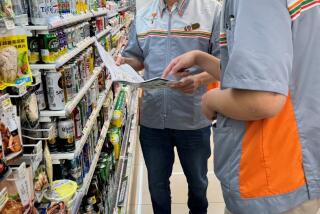7-Eleven Preparing to Cash In on Consumers’ Y2K Fears
- Share via
Sometime in December, 7-Eleven employees plan to remove the promotional signs for Colombian coffee from stores and replace them with banners that go something like this: Y2K Ready--4U!
Inside, customers will find shelves bulging with extra quantities of bottled water, canned tuna, candles, flashlights and videos that explain how to prepare for power outages and other emergencies that may erupt when the year 2000 begins.
Virtually alone among major retailers, 7-Eleven Inc., the nation’s largest convenience store chain, is preparing to cash in on consumers’ fears about possible computer failures linked to the beginning of the year 2000.
“We started out several months ago thinking about the Y2K problem,” said James W. Keyes, chief operating officer of 7-Eleven Inc. “We’ve gone from that to realizing this may be the single biggest opportunity we’ve ever had. It has gone from a Y2K problem to a Y2K opportunity.”
The preparations don’t stop with essential consumables, which will go into stores beginning in November. In case there’s a run on champagne by partyers, 7-Eleven will have its own private label of bubbly on hand. And if consumers rush the gas pumps, the retailer says it will have gasoline tanker trucks on standby.
Whether 7-Eleven is remembered as the retailer that boldly cashed in on Y2K fears and revelry --or got stuck with millions of unsold rolls of toilet paper and $6.99 bottles of champagne--has yet to be determined.
Such is the problem of predicting behavior in December, when the year 2000 phenomenon meets the hectic holiday shopping period, creating the potential for a crush of last-minute buying and possibly the biggest headache ever for the nation’s retailers.
“I think it’s going to be ugly,” said Cathy Hotka, vice president for information technology at the National Retail Federation. “The message we’ve had for consumers: Please buy some stuff, but buy it now.”
Business and government leaders have warned that consumers’ jamming gasoline pumps and checkout lines, and hoarding food and medicines could create more problems than any technological failures from year 2000 computer breakdowns. So the biggest retail chains are treading carefully, quietly boosting inventories of such items as batteries while telling customers to keep cool.
“Retailers and manufacturers do not want to be perceived as fanning the flames of customer panic,” Hotka said. “So far, there has been no panic. But retailers know if they tamper with customers’ buying models, they could end up with a wacky buying season.”
In fact, Wal-Mart Stores Inc., Home Depot Inc. and other large retailers don’t want consumers snapping up generators, tents or anything else that might be returned after Jan. 1, Hotka said.
But 7-Eleven executives say they have little to lose. If widespread power failures occur, the retailer trumps its competitors. If customers overreact, 7-Eleven isn’t overly worried because few people return convenience store items.
Retail analysts say the chain runs the risk that first-quarter sales next year will slump if nothing happens and its stores are overstocked. But 7-Eleven officials say they’re confident consumer demand will be strong enough to absorb any excess inventories after Jan. 1 before it suffers losses.
More to Read
Inside the business of entertainment
The Wide Shot brings you news, analysis and insights on everything from streaming wars to production — and what it all means for the future.
You may occasionally receive promotional content from the Los Angeles Times.










